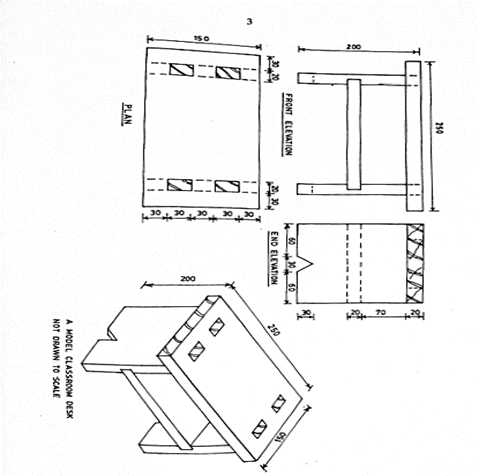Questions
1. Construct the test piece shown on page 3 using the materials which have been prepared to the following finished sizes.
(All dimensions are in millimetres)
S/N |
QUANTITY |
DESCRIPTION |
SIZE |
MATERIAL |
1. |
2 |
Sides |
210 ×150 × 20 |
Hardwood |
2. |
1 |
Top |
260×150 × 20 |
Hardwood |
3. |
1 |
Shelf |
190 × 150× 20 |
Hardwood |
2. You may use any of the ordinary hand tools but the use of glue, glass paper,
files, rasps and scrapers isnot allowed.
3. Dimensions which are omitted from the drawing are left to your own discretion.
4. If you make any mistake, work as near to the drawing as possible. Additional materials will not be supplied.
5. Print your name and index number clearly on each piece of wood and assemble your work before handing it over to the Supervisor.
Observation
MODEL OF A CLASSROOM DESK

This question requires the candidates to interpret the working drawing and make use of various hand tools to construct a model of a classroom desk with different joints using the given specifications.
The major requirement in furniture making is the ability of the candidates to construct basic joints. Candidates demonstrated great strength in their practical examination.
Candidates were expected to carry out the following activities.
- Pin Joint
- Through pins
Marking joint
Cutting joint
- Socket
Marking joints
Chiseling joints
- Stopped Housing Joint
- Marking the tails
- Cutting the tails
- Marking the trenches
- Cutting and removing waste
- The V shape
- Marking the V shape
- Cutting the V shape
- Assembly
- Accuracy
- Squareness
- Fitness
- Dimensions
